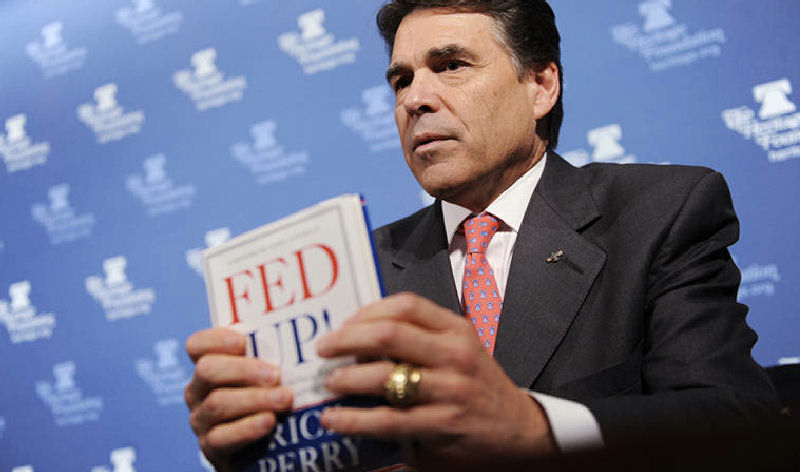Res Judicata: Perry's Faux Federalism

Is Rick Perry a real supporter of federalism? I have my doubts.
As I wrote last week, the concept of federalism is based upon the allocation of powers between the federal government and the states. Article I §8 enumerates the specific subjects reserved for Congress. The Tenth Amendment leaves legislating about everything else to the states. At least that was the original intent of the founders.
As we know, Congress has pretty much ignored these limitations since the 1930’s, and the Supreme Court has let these extra-constitutional enactments go unpunished with a very few exceptions since FDR threatened to expand the Court. Federalism fell so far out of favor after the New Deal period that it was not openly discussed in any presidential campaign until 1980. Anyone who raised the issue of federalism in those decades was branded a segregationist because it was the rallying cry of the southerners opposed to civil rights.
In the 1980’s Ronald Reagan talked about federalism, making it at least a respectable topic. He actually did almost nothing to reduce the size of the federal government, but the idea lives on in the speeches of Tea Party supporters. Gov. Rick Perry has talked quite a bit about federalism even before the Tea Party. In a 2009 speech he called for a return to the “letter and spirit of the U.S. Constitution and its essential Tenth amendment.” His “book” written a few years ago (almost certainly ghostwritten, as all of these campaign manifestos are), even called Social Security unconstitutional. By that he means not authorized by Art. I of the Constitution (despite being upheld by the Supreme Court).
So does Gov. Perry now advocate the repeal or replacement of Social Security? He does not. Is that because he has recently read the Supreme Court decision and had a change of heart, or more likely, is he pragmatically pulling his political punches? He knows the country is not ready to ditch Social Security. And he desperately wants to win Iowa, whose senior senator, Charles Grassley, stopped President Bush’s modest proposal to partially privatize Social Security in 2005. Does Gov. Perry even support the Ryan Plan? So far, no. What federal programs does Gov. Perry want to eliminate? The list should fill dozens of gigabytes of space. But it doesn’t. His official campaign website provides little detail about anything. But it tells me all I need to know. He is a fraud. Not a single program is slated for closure, and that deafening silence indicates Gov. Perry will be another George W. Bush compassionate conservative. Government will pretty much keep on growing if he is elected president.
Apparently even Texans would rather not go on the political equivalent of a raw food diet either. As the New York Times reported, as governor, he fought often and aggressively for federal subsidies, and in the 1980’s he accepted federal loans to run his marginally profitable and apparently thinly capitalized farm. So Gov. Perry is not really a federalist after all. He merely poses as one.
I once worked for a senatorial candidate in Massachusetts who had a similar problem. He too advocated a drastically slimmed down federal budget. He too demurred when asked to name programs he would abolish. And then his opponent, John Kerry, pointed out the fact that his company, in its fledgling days, had applied for and received a loan from the Small Business Administration. You could almost feel the air seep out of the campaign when that revelation went unchallenged for days. Our campaign never really recovered. Perhaps the electorate would have entertained the idea of serious cutbacks in the federal government by a candidate who has the moral authority to talk about the virtues of thrift and sacrifice. But they won’t, and shouldn’t, listen to such an appeal from a hypocrite.
Running for president is not like running for governor. Candidates have to hone their national messages over time. Ronald Reagan was a moderate governor of California who raised taxes and fought for federal subsidies. This did not prevent him from successfully remaking himself as a conservative alternative to President Ford. But he did so over time, in hundreds of columns and speeches earning the moral authority to take conservative positions. But Gov. Perry has little time to remake himself, and when he cannot pose as a believer in federalism, or even limited government, without a list of programs he’d cut. Here his rhetoric simply cannot turn into reality.

